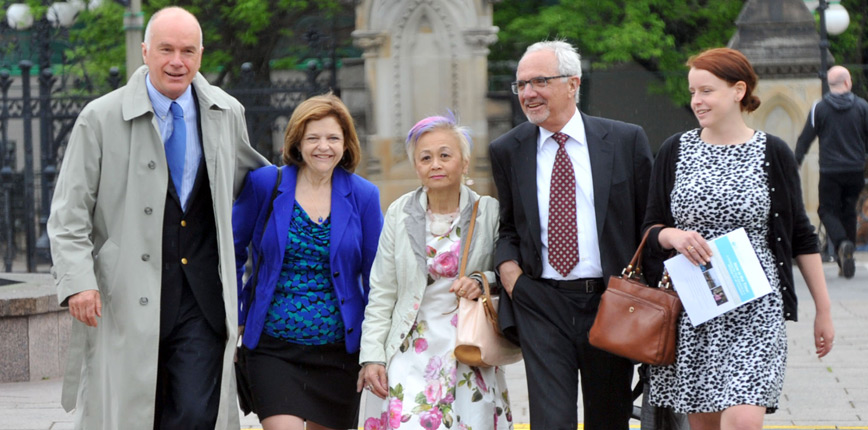
Canada’s Rare Disease Strategy Cross-Country Awareness-Building Tour
CORD has partnered with the Economic Club of Canada (ECC) to present Canada’s Rare Disease Strategy in Toronto on September 24, 2015 and other cities are planned across Canada.
Location and Date:
- Edmonton: Wednesday, October 7, 2015 (Westin Hotel)
- Ottawa: Monday, November 9, 2015 (Fairmont Chateau Laurier)
- Montreal: Tuesday November 24, 2015 (venue TBC)
- Vancouver: Wednesday, January 20, 2016 (venue TBC)
Click here for more information and to purchase event tickets through the Economic Club of Canada
Rare Diseases: A Public Health Issue
In just a few years, Canada has emerged from a state of “not needing an Orphan Drug Policy” to becoming an acknowledged global leader in rare diseases, especially in research and patient advocacy. Which makes now a very good time to focus our efforts toward implementing Canada’s Rare Disease Strategy.
Admittedly, Canada has been late to embrace rare diseases. It was just five years ago that CORD pointed out that Canadians had access to only half of the orphan drugs approved in the USA and/or Europe. Approved drugs were routinely rejected for coverage by the public drug plans. Even today, there remains a lag of two to seven years for patients to get access. Similarly, over the past 30 years, while the USA, Europe, and Japan have invested hundreds of millions of dollars in rare disease research, Canada did not target research funding for rare diseases until 2012. But things are changing rapidly, with Canada’s Orphan Drug Regulatory Framework due to be implemented imminently and Canadian research sites now among the leaders in international collaborative projects.
Similarly, in 2009 when the European Union called for the development of national rare disease plans, almost all member states responded, as have countries outside the EU, such as Mexico and Peru. Integral to the national plans are Centres of Reference, for which the EU will issue a call for proposals in fall 2015.
Meanwhile in Canada, we have pockets of rare disease expertise, but most are neither linked to general practitioners and paediatricians nor formally to one another. Hence the need for the coalescing force of Canada’s Rare Disease Strategy and the call to collaborate on a five-point action plan so that collectively we can:
- Improve early detection and prevention
- Get the right care to patients as early as possible
- Enhance community support
- Provide sustainable access to promising therapies
- Promote innovative research.
A key to success in Europe has been endorsement of “solidarity” as a fundamental value and “equal access” as a guiding principle for all patients regardless of what they suffer from or where they live. Rare diseases are not limited to a small population but are regarded as a public health issue affecting everyone.
Intended Audience: Senior Leaders from business, government industry, academic and media organizations.
Media Coverage: The dialogues are intended to be a high profile event with extensive media coverage. CPAC will be invited, as will leading health reporters and advocacy groups from across the country.
Featuring:
- The Honourable Fred Horne, Former Minister of Health Alberta
- Durhane Wong-Rieger, President & CEO of Canadian Organization for Rare Disorders
- Clarissa Desjardins, Founder and CEO of Clementia Pharmaceuticals
- Dr. Daniel J. Drucker, Lunemfeld Tanenbaum Research Institute, Mt Sinai Hospital
Moderated by: The Honourable Fred Horne, Former Minister of Health, Alberta
Click here for more information and to purchase event tickets through the Economic Club of Canada
Sponsored by
Event
RARE DISEASE DAY 2024 CANADIAN ILLUMINATIONS
On February 29, 2024 these monuments will be lit up in honor of Rare Disease Day. #LightUpForRare Amherst Town Hall in Amherst Nova ScotiaBrampton Clock TowerBritish Columbia LegislatureBritish Columbia PlaceCalgary TowerEdmonton High Level BridgeEdmonton TowerFred A. Lundy bridge in Newmarket, ONMississauga City HallNanaimo BastionNiagara Falls (10:00pm – 10:15pm.) [Live cam link: https://www.earthcam.com/canada/niagarafalls/?cam=niagarafalls_str]Niagara sign in Thorold/Niagara regionOakville Town HallOlympic Cauldron Vancouver Convention CentrePeterborough City HallSales Of Light VancouverScience World Vancouver (FEB 28th)Signal Hill in St. John’s, NLThe Hamilton SignToronto CN TowerToronto Sign in Nathan Phillips SquareVaughan City HallVancouver Convention CentreThe Peace Bridge between Canada and the US Winnipeg Sign Winnipeg Bridge Let us know if there are other Canadian illuminations to add. Tag us on social media @raredisorders (Twitter/X), @raredisorders_cord (Instagram) or email us at info@raredisorders.ca with your photos of the monuments and Rare Disease Day events.
BECOME A MEMBER
Join us and become part of an active Canadian rare disorder community. The only national organization representing all rare disorder patient groups in Canada.
LEARN MORE